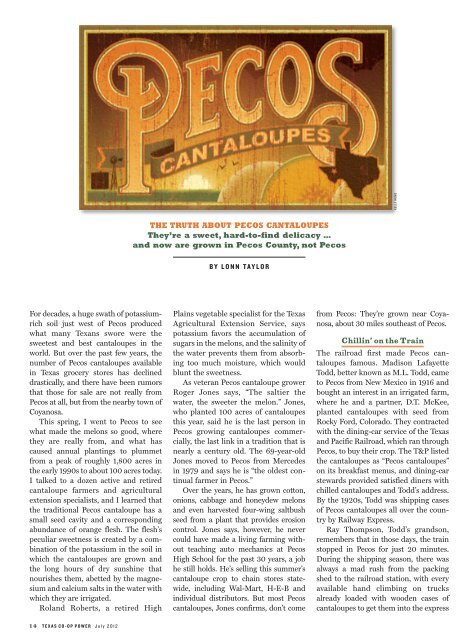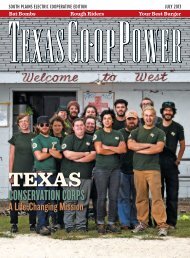SPEAKING UP for HERITAGE
Texas Co-op Power ⢠July 2012 - South Plains Electric Cooperative
Texas Co-op Power ⢠July 2012 - South Plains Electric Cooperative
You also want an ePaper? Increase the reach of your titles
YUMPU automatically turns print PDFs into web optimized ePapers that Google loves.
KELLY HUME<br />
THE TRUTH ABOUT PECOS CANTALO<strong>UP</strong>ES<br />
They’re a sweet, hard-to-find delicacy …<br />
and now are grown in Pecos County, not Pecos<br />
BY LONN TAYLOR<br />
For decades, a huge swath of potassiumrich<br />
soil just west of Pecos produced<br />
what many Texans swore were the<br />
sweetest and best cantaloupes in the<br />
world. But over the past few years, the<br />
number of Pecos cantaloupes available<br />
in Texas grocery stores has declined<br />
drastically, and there have been rumors<br />
that those <strong>for</strong> sale are not really from<br />
Pecos at all, but from the nearby town of<br />
Coyanosa.<br />
This spring, I went to Pecos to see<br />
what made the melons so good, where<br />
they are really from, and what has<br />
caused annual plantings to plummet<br />
from a peak of roughly 1,800 acres in<br />
the early 1990s to about 100 acres today.<br />
I talked to a dozen active and retired<br />
cantaloupe farmers and agricultural<br />
extension specialists, and I learned that<br />
the traditional Pecos cantaloupe has a<br />
small seed cavity and a corresponding<br />
abundance of orange flesh. The flesh’s<br />
peculiar sweetness is created by a combination<br />
of the potassium in the soil in<br />
which the cantaloupes are grown and<br />
the long hours of dry sunshine that<br />
nourishes them, abetted by the magnesium<br />
and calcium salts in the water with<br />
which they are irrigated.<br />
Roland Roberts, a retired High<br />
Plains vegetable specialist <strong>for</strong> the Texas<br />
Agricultural Extension Service, says<br />
potassium favors the accumulation of<br />
sugars in the melons, and the salinity of<br />
the water prevents them from absorbing<br />
too much moisture, which would<br />
blunt the sweetness.<br />
As veteran Pecos cantaloupe grower<br />
Roger Jones says, “The saltier the<br />
water, the sweeter the melon.” Jones,<br />
who planted 100 acres of cantaloupes<br />
this year, said he is the last person in<br />
Pecos growing cantaloupes commercially,<br />
the last link in a tradition that is<br />
nearly a century old. The 69-year-old<br />
Jones moved to Pecos from Mercedes<br />
in 1979 and says he is “the oldest continual<br />
farmer in Pecos.”<br />
Over the years, he has grown cotton,<br />
onions, cabbage and honeydew melons<br />
and even harvested four-wing saltbush<br />
seed from a plant that provides erosion<br />
control. Jones says, however, he never<br />
could have made a living farming without<br />
teaching auto mechanics at Pecos<br />
High School <strong>for</strong> the past 30 years, a job<br />
he still holds. He’s selling this summer’s<br />
cantaloupe crop to chain stores statewide,<br />
including Wal-Mart, H-E-B and<br />
individual distributors. But most Pecos<br />
cantaloupes, Jones confirms, don’t come<br />
from Pecos: They’re grown near Coyanosa,<br />
about 30 miles southeast of Pecos.<br />
Chillin’ on the Train<br />
The railroad first made Pecos cantaloupes<br />
famous. Madison Lafayette<br />
Todd, better known as M.L. Todd, came<br />
to Pecos from New Mexico in 1916 and<br />
bought an interest in an irrigated farm,<br />
where he and a partner, D.T. McKee,<br />
planted cantaloupes with seed from<br />
Rocky Ford, Colorado. They contracted<br />
with the dining-car service of the Texas<br />
and Pacific Railroad, which ran through<br />
Pecos, to buy their crop. The T&P listed<br />
the cantaloupes as “Pecos cantaloupes”<br />
on its breakfast menus, and dining-car<br />
stewards provided satisfied diners with<br />
chilled cantaloupes and Todd’s address.<br />
By the 1920s, Todd was shipping cases<br />
of Pecos cantaloupes all over the country<br />
by Railway Express.<br />
Ray Thompson, Todd’s grandson,<br />
remembers that in those days, the train<br />
stopped in Pecos <strong>for</strong> just 20 minutes.<br />
During the shipping season, there was<br />
always a mad rush from the packing<br />
shed to the railroad station, with every<br />
available hand climbing on trucks<br />
already loaded with wooden cases of<br />
cantaloupes to get them into the express<br />
14 TEXAS CO-OP POWER July 2012










